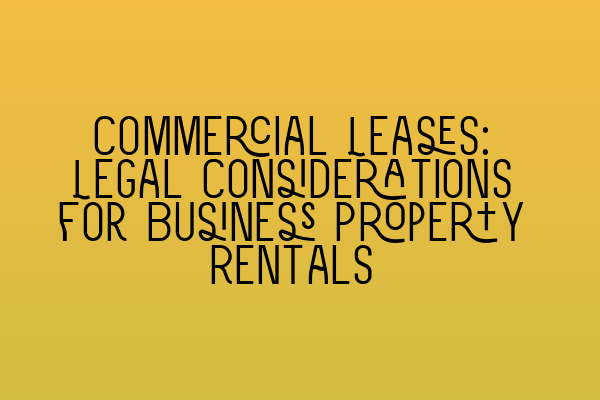Commercial Leases: Legal Considerations for Business Property Rentals
Welcome to SQE Property Law & Land Law. As expert solicitors specializing in property law, we understand the complexity and importance of commercial leases for businesses. Whether you are a landlord or a tenant, it is essential to have a solid understanding of the legal considerations involved in business property rentals. In this blog post, we will explore the key legal aspects that need to be taken into account when entering into a commercial lease agreement.
1. Lease Terms and Negotiations
Commercial leases vary widely in terms of their structure and provisions. It is crucial for both landlords and tenants to negotiate the lease terms that best serve their interests. This includes considerations such as the length of the lease, rent review clauses, break options, and rent payment obligations.
A qualified property solicitor can guide you through the negotiation process and ensure that the lease terms are fair and reasonable. With their expertise, they can help you strike a balance to protect your interests while maintaining a positive landlord-tenant relationship.
For further insight into commercial lease negotiations, you may find our article on SQE 1 Practice Exam Questions helpful.
2. Use and Permitted Alterations
One crucial aspect of commercial leases is defining the permitted use of the property. A landlord may impose certain restrictions on how the premises can be utilized, while a tenant will want the freedom to conduct their business activities efficiently.
Additionally, tenants often require the flexibility to make alterations to the property to suit their specific needs. It is imperative to include provisions regarding permitted alterations in the lease agreement to avoid any disputes or misunderstandings.
If you are preparing for the SQE exams and would like to test your knowledge on property law, we recommend trying out our SQE 1 Practice Mocks FLK1 FLK2.
3. Rent and Service Charges
Both tenants and landlords should fully understand the rent and service charge provisions outlined in the commercial lease. The lease agreement should clearly state the rent payment terms, the frequency of rent reviews, and any additional costs that the tenant may be liable to pay.
Service charges are often applicable in commercial lease agreements and cover the costs of maintaining and managing the property. It is vital for tenants to have a clear understanding of the service charges they are responsible for and how they are calculated.
For comprehensive preparation for the SQE exams, take a look at our SQE 2 Preparation Courses.
4. Dilapidations and Repairs
Commercial leases generally include provisions regarding the tenant’s responsibility for repairs and dilapidations. Landlords will want to ensure that the property is well-maintained, while tenants need to understand their obligations for repairs and the potential consequences if they fail to fulfill them.
It is essential to conduct a thorough inspection of the property before signing the lease to identify any existing defects or damage. This will help avoid disputes over the condition of the property at the end of the lease term.
If you are looking for expert guidance to prepare for the SQE exams, check out our SQE 1 Preparation Courses.
5. Termination and Renewal
Commercial leases have expiration dates, and both parties need to understand the process for terminating or renewing the lease. The lease agreement should clearly outline the notice period required for termination, as well as any renewal options available to the tenant.
It is advisable to seek legal advice well in advance of the lease expiration to ensure that the necessary steps are taken. Planning ahead will give both parties ample time to negotiate new lease terms or seek alternative premises if needed.
If you are curious about the upcoming SRA SQE exam dates, we have compiled a comprehensive list for your convenience. Check out our article on SRA SQE Exam Dates.
Conclusion
Commercial leases are highly complex legal documents that require careful consideration and negotiation. Engaging the services of an experienced property solicitor is crucial to ensure that your interests are protected and that the lease terms are fair and equitable.
If you have any questions or would like to discuss your commercial lease requirements with one of our property law experts, please feel free to contact us at SQE Property Law & Land Law. We are here to assist you every step of the way.
